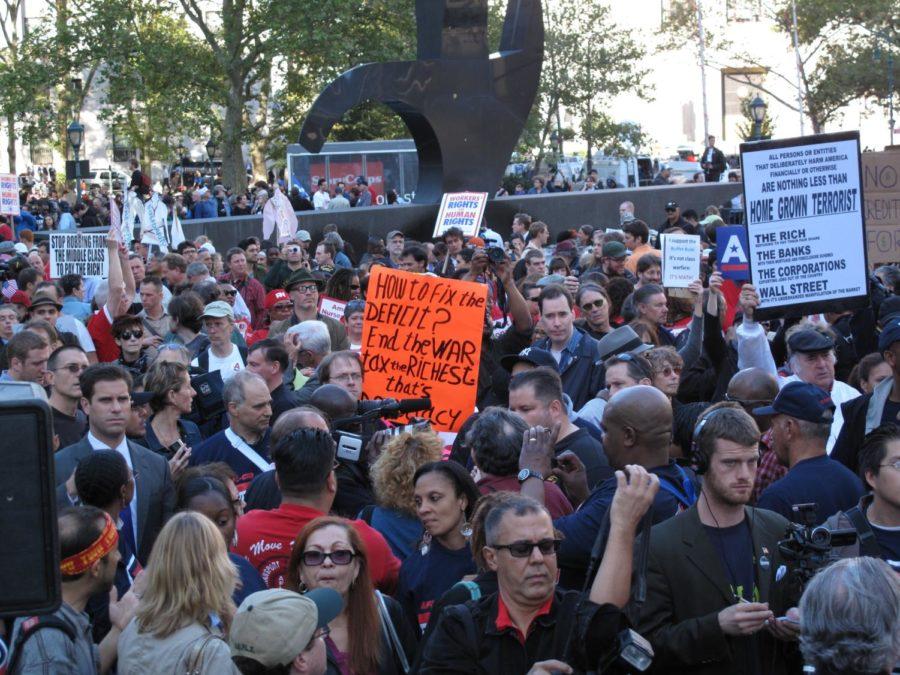As movement spreads, NY mayor slams protesters for ‘trying to destroy’ jobs
Photo courtesy of Vivienne Foley
As the Occupy Wall Street protesters rally for a third week, social media sites such as Twitter seem to be spurring similar protests in other cities.
October 8, 2011
As the Occupy Wall Street movement grew and touched even more U.S. cities Saturday, the mayor of the city where it began blasted many involved and claimed they were targeting the nation’s financial sector and “trying to destroy the jobs of working people” in New York City.
The protest effort continued into its 22nd day in New York on Saturday. Yet its spread well beyond that city, with its anti-corporation, anti-government message echoing in many places this weekend — from Cleveland to Las Vegas, from Washington to Prescott, Ariz.
Yet this growing fervor has been met, in some cases, by vocal commentary. That includes New York Mayor Michael Bloomberg, who in a WOR radio appearance Friday said that city’s labor unions — many of whom swelled demonstrator ranks earlier this week — depend on salaries that “come from the taxes paid by the people they’re trying to vilify.”
The mayor did describe the city’s unemployment rate as “unacceptably high,” and acknowledged that “a lot of people are disaffected.”
“Some are legit, some aren’t,” Bloomberg said, describing the concerns of the demonstrators in Lower Manhattan.
His comments coincided with the city’s announcement that 700 education workers will be laid off in an effort to close a budget gap. They also follow recently released census data that shows New York’s poverty level has increased to 20.1 percent, the highest in more than a decade.
The remarks drew criticism from Tyler Combelic, a spokesman for Occupy Wall Street, who claimed Bloomberg “hasn’t really represented all of New Yorkers.”
“The fact is there are thousands and thousands of us out on the streets, and he’s not really recognizing that we’re a movement,” Combelic told CNN on Saturday. “We should be heard by New York politicians.”
On Saturday, New York protesters set up a second base at Washington Square Park. The park in Greenwich Village is about two miles north of Zuccotti Park, a private park that’s been considered the main rallying point for the largely leaderless movement in the city.
A rally was held in Washington Square, followed by a now-customary people’s assembly to discuss the movement and an art show Saturday evening. Demonstrators won’t stay overnight at Washington Square Park, unlike Zuccotti, because it is a municipal park with a midnight curfew.
As of 9 p.m., the New York Police Department did not report any related arrests.
The ambiguously defined movement against corporate greed and other social ills has spread to more than a dozen cities, spurred lately by support from unions and other groups.
“Social and economic inequalities are the tipping point, and people are hungry for getting involved and trying to do something to change it,” Jim Nichols, who has been involved in Occupy Atlanta protests, told CNN on Saturday. “It’s almost like, I want the American dream back.”
Even before Bloomberg’s comments Saturday, the effort was stirring a growing number of strong reactions from public figures.
President Barack Obama, even as he defended the need for a vibrant financial sector, acknowledged that the protesters “are giving voice to a more broad-based frustration about how our financial system works.” The No. 2 Republican in the U.S. House of Representatives, Eric Cantor, meanwhile, slammed what he called the “growing mobs” who he claimed were “pitting … Americans against Americans.”
On Saturday, U.S. Rep. Charles Rangel backed the demonstrators — whom he has been visiting regularly over the past three weeks — for venting their frustrations and exercising their constitutional rights.
“Their dreams are being shattered,” Rangel told CNN’s Don Lemon. “They may be an inconvenience to a whole lot of people in that area, but people are going to sleep at night with an economic nightmare.”
The New York Democrat urged “more spiritual leaders” to join a movement he claimed championed the poor and disadvantaged, saying “there’s no moral reason why they have to wait for something to catch on.” He also dismissed criticism that the demonstrators don’t have a coherent purpose, saying despite their varied issues and lack of organization, their sentiments are raw and real.
“They don’t have to know what the solution is,” he said. “There’s one thing they know is (there’s) something wrong when so many people are out of work, and we find the disparity with the very rich. … Something is wrong.”
Combelic, the New York spokesman, said the movement chiefly is trying to showcase “active democracy and [show that] everyone has a voice in government.” He said the protests — which have been associated with progressive causes — are “a rebuke of government, that includes the left and the right.”
“We’re trying to broaden the discussion base. … We’re trying to represent 99% of the country that’s felt disenfranchised over the past five years because of the recession,” Combelic said. “(Politicians) have not come together, they’ve not compromised on anything, and there’s a reason why there’s [low] congressional approval in this country.”
The demonstrations have been largely peaceful. But in New York, some have been marred by scuffles with police.
Last Saturday, police made hundreds of arrests as demonstrators marched without a permit toward the Brooklyn Bridge, blocking city traffic for hours.
A week earlier, authorities detained dozens of protesters as they marched, also without a permit, through Manhattan’s financial district toward Union Square.
CNN’s Susan Candiotti and Ross Levitt contributed to this report.







